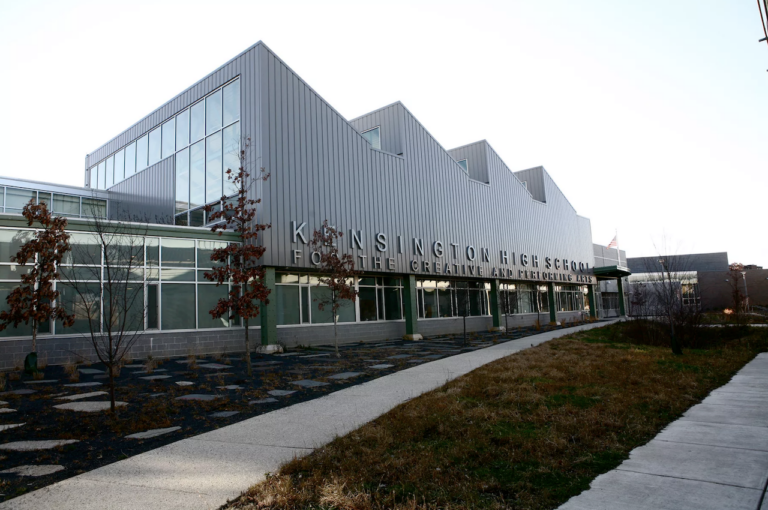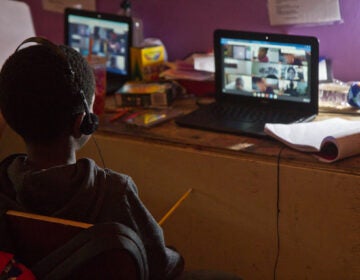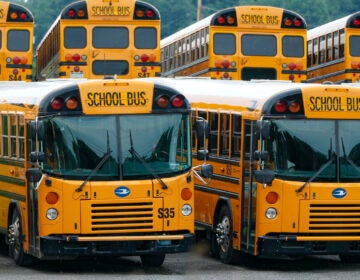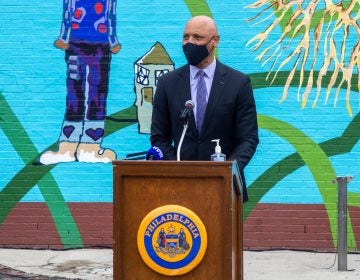Students at Kensington CAPA might stage ‘logout’ protest, principal says
Students at Kensington CAPA started an online petition two weeks ago to demand an alternate schedule, which would reduce class times to 50 minutes instead of 90 minutes.

Kensington Creative and Performing Arts High School. (Harvey Finkle/The Notebook)
This article originally appeared on Chalkbeat Philadelphia.
—
Students at Kensington Creative and Performing Arts High School have argued in recent weeks that their schedule requires too much screen time. Now they might protest by refusing to log in to virtual classes, the school principal wrote in a letter to families Friday.
In her letter, Principal Patricia M. McDermott-Fair stated the school had “received communication” that some students and staff might stage a “logout” protest on Monday.
“I understand that frustrations might be heightened because of the very unusual circumstances that we’re all living in these days,” McDermott wrote.
Students who don’t log in to class on Monday will receive an unexcused absence, she said. In a separate letter sent to Kensington CAPA staff, McDermott-Fair said she expected staff members to follow their schedule when school resumes on Monday.
“As we continue to move forward in this process I ask that you continue to communicate directly with us because this is a process that requires teamwork,” she wrote.
Students at Kensington CAPA started an online petition two weeks ago to demand an alternate schedule, which would reduce class times to 50 minutes instead of 90 minutes. They argued the long hours in front of screens are excessive and unhealthy. Students also have complained about eye strain. The petition has nearly 500 signatures as of Friday.
Students attend class between 8 a.m. and 3:04 p.m., nearly six hours a day, even with small breaks and lunch.
“After 3:04 the work really doesn’t stop there,” said Dena Stileslawson, a sophomore at Kensington CAPA. “There’s homework and studying. It’s difficult when students have outside responsibilities like taking care of their children and siblings.”
The proposed schedule would start at 9 a.m. and end at 2:25 p.m., with a longer lunch and homeroom and five-minute breaks between each class. They would like no screens on Fridays.
When the petition was created students said they considered a one-day strike of not logging into class if their concerns were not addressed by school and district officials.
McDermott said in her letter that she hopes all students attend classes during the next two weeks before the winter break. She suggested there could be an “opportunity to implement a revised plan when school resumes in January.”
“However, we can not do so if we are unwilling to work together,” she wrote.
Some teachers at Kensington CAPA are supporting the students’ concerns about the amount of daily screen time. They have noticed fatigue and learning loss in their students.
“The initial concern started right away when students in class and in the homeroom would complain how difficult it was to keep up with work and to understand the material,” Ismael Jimenez, a Kensington CAPA history teacher, said. “They would stop the class and bring it up. Things have cascaded to what we are seeing now.”
Ivan Juarez teaches ninth grade Algebra at Kensington CAPA. His students are mostly new to the demands of high school.
“We are putting on them to be live from 8 a.m to 3 p.m. and then be on their computers afterward with more work and continued practice with other assignments they need to complete,” he said. “They express fatigue with being online for so long and not getting one-on-one communication with teachers.”
Kristen Peeples, a 10th grade English teacher at Kensington CAPA, said she understands the school district tried to get students into a schedule similar to in-person school. But the heavy demands of the virtual schedule was meant to be temporary.
“This stress, burnout and fatigue has been existing since March,” Peeples said. “We heard from students this fall that it was difficult to get motivated just to get out of bed.”
Sharon Carr, the choir teacher at Kensington CAPA, said she had one student say she hated the school.
“It broke my heart how she told me how she’s overwhelmed and unable to concentrate and keep up with the workload,” Carr said. “She knows she did better last year than this year.”
Danika Nieves, 11th grade English teacher at Kensington CAPA, said she understands the intention behind creating the schedule at the beginning of the year was to provide normalcy — “but we basically took what we have in brick and mortar and transitioned it to virtual without considering that it’s not physical.”
“Our students have to be the priority,” she said. “Their mental wellness has to come first before jamming through X hours of curriculum. Otherwise what are we all doing?”
Teachers also said virtual learning is not the same as playing video games, a criticism they have heard about the students protesting.
“The students are sleeping in the same room, in classes in the same room, and doing everything from their bedrooms,” Carr said. “This is where the overload is coming from — everything is in the same place on their bed.”
Chalkbeat is a nonprofit news site covering educational change in public schools.
WHYY is your source for fact-based, in-depth journalism and information. As a nonprofit organization, we rely on financial support from readers like you. Please give today.



![CoronavirusPandemic_1024x512[1]](https://whyy.org/wp-content/uploads/2020/03/CoronavirusPandemic_1024x5121-300x150.jpg)


